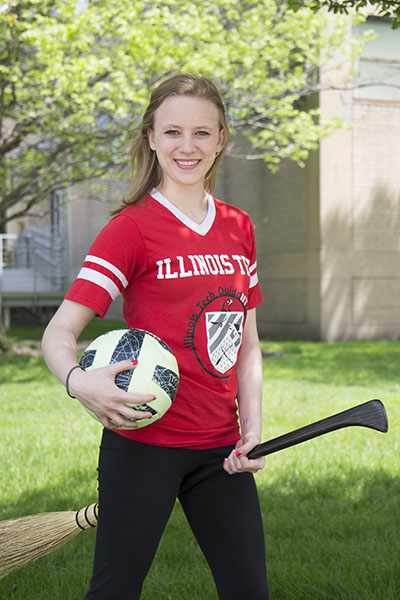
Amy Zasadzinski (BIOL 4th year) wants to make a few things as clear as Harry Potter’s crystal Orb:
“Girls can do some serious damage on the field,” she says, with a tone of wicked delight in her voice. “Guys can full-on tackle a girl to the ground, but what they don’t realize is that the girls will get them right back.”
Zasadzinski is describing the game of quidditch, a down-to-earth version of “Quidditch,” the national sport of wizards, as coined by J. K. Rowling, author of the popular Harry Potter series of novels. Incorporating elements of soccer and tag football, the game consists of two teams of seven players whose goal is to score points by throwing balls through hoops and catching a player called the “Golden Snitch.” Zasadzinski, who plays offense, says that endurance, the ability to run quickly and continuously, and the desire to participate in an adrenalin-fueled coed sport are qualities that make for the best quidditch players.
“A lot of people might think that it’s a really nerdy sport and that the only way they would like it is if they know exactly what is going on in the books,” says Zasadzinski, founder and president of Illinois Tech’s premiere quidditch club team, QuiddIITch. “But I would say that a good majority join for the athletic aspect.”
Formed in 2015 the team has participated in two local tournaments taking second in each. With a five-person executive board now in place, Zasadzinski says that the goal is to increase the number of regular players from nine to 15 for 2016–17, her final year at the university. She admits that attracting female players to QuiddIITch has been challenging as the team adheres to Title 9 , a designation established by the United States Quidditch Association. Named after the Hogwarts Express train platform number in the Potter series, Title 9 is a spin-off of the anti-sex discrimination designation Title IX of the Education Amendments Act of 1972. As such, QuiddIITch has at least two members of each gender on the field at a time.
The first quidditch team in the United States was established in 2005 at Vermont’s Middlebury College; two years later, the first intercollegiate Quidditch World Cup was held. The International Quidditch Association organized a biannual global competition in 2012 with teams from Australia, Canada, France, the United Kingdom, and the United States participating. The 2016 World Cup will be held July 23–24 in Frankfurt, Germany. For today Zasadzinski is content to stay closer to home where, with a good bit of ingenuity and a little bit of magic, she can work to ensure QuiddIITch’s future on campus.
“During my college search I said that I’m either going to a college where I could join the quidditch team—or I’m going to a college and put together one,” she says with a laugh. “Starting QuiddIITch was one of the hardest things I’ve ever done; it was a huge learning experience.”